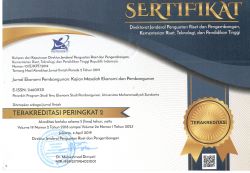Food Diversification and Dynamic Food Security: Evidence from Poor Households
Dini Yuniarti(1*), Yunastiti Purwaningsih(2), AM Soesilo(3), Agustinus Suryantoro(4)(1) Faculty of Economics and Business, Universitas Ahmad Dahlan
(2) Faculty Economics and Business, Universitas Sebelas Maret
(3) Faculty of Economics and Business, University of Sebelas Maret
(4) Faculty of Economics and Business, University of Sebelas Maret
(*) Corresponding Author
Abstract
Keywords
Full Text:
PDFReferences
Amwata, D. A., Nyariki, D. M., & Musimba, N. R. K. (2016). Factors Influencing Pastoral and Agropastoral Household Vulnerability to Food Insecurity in The Dryland of Kenya: A Case Study of Kajiado and Makueni Counties. Journal OfInternational Development J. Int. Dev. 28, 771–787 (2016), 787(July 2015), 771–787. https://doi.org/10.1002/jid
Ariani, M., & Ashari, N. (2003). Arah, Kendala dan Pentingnya Diversifikasi Konsumsi Pangan di Indonesia. Forum Penelitian Agro Ekonomi, 21(2), 99. https://doi.org/10.21082/fae.v21n2.2003.99-112
Arumsari, V., Dwi, W., & Rini, E. (2005). the Role of Woman on Household Food Security in.
Badan Penelitian dan Pengembangan Pertanian. (n.d.). Mengenal KRPL.
Chagomoka, T., Unger, S., Drescher, A., Glaser, R., & Marschner, B. (2016). Food coping strategies in northern Ghana . A socio ‑ spatial analysis along the urban – rural continuum. Agriculture & Food Security, 1–18. https://doi.org/10.1186/s40066-016-0052-x
Cordero-Ahiman, O. V., Santellano-Estrada, E., & Garrido, A. (2018). Food access and coping strategies adopted by households to fight hunger among indigenous communities of Sierra Tarahumara in Mexico. Sustainability (Switzerland), 10(2), 1–14. https://doi.org/10.3390/su10020473
Demeke, A. B., & Zeller, M. (n.d.). Impacts of Rainfall Shock on Smallholders Food Security and Vulnerability in Rural Ethiopia : Learning from Household Panel Data. Haile 2005, 1–24.
Ejaz, R., Khan, A., Azid, T., & Mohammad Usama Tosee. (2012). Determinants of food security in rural areas of Pakistan. International Journal of Social Economic, 39(12), 951–964. https://doi.org/10.1108/03068291211269082
Gemechu, F., Zemedu, L., & Yousuf, J. (2016). Determinants of farm household food security in Hawi Gudina district , West Hararghe zone , Oromia Regional National State , Ethiopia. Journal of Agricultural Extension and Rural Development Full, 8(February), 12–18. https://doi.org/10.5897/JAERD2014.0660
Gregory, P. J., Brklacich, M., & Ingram, J. S. I. (2005). Climate Change and Food Security. Philosophical Transactions. Biological Sciences, 1463(360), 2139–2148. https://doi.org/10.2307/30041400
Gupta, P., Singh, K., Seth, V., Agarwal, S., & Mathur, P. (2015). Coping Strategies Adopted by Households to Prevent Food Insecurity in Urban Slums of Delhi , India. Journal of Food Security, 3(1), 6–10. https://doi.org/10.12691/jfs-3-1-2
Habtezion, S. (2012). Gender , agriculture and food security (Gender and). http://www.undp.org/content/dam/undp/library/gender/Gender and Environment/Training-Module-Gender-Agriculture-and-Food-Security.pdf
Hardana, A. E., Pratiwi, D. E., & Ambayoen, M. A. (2019). Analisis Faktor-Faktor yang Mempengaruhi Keputusan Petani Hortikultura dalam Mengakses Pembiayaan Mikro di Jawa Timur. Prosiding Seminar Nasional Lingkungan Lahan Basah, 4(April), 38–44. https://snllb.ulm.ac.id/prosiding/index.php/snllb-lit/article/viewFile/156/157
Kassie, G. W., Kim, S., & Fellizar, F. P. (2017). Determinant factors of livelihood diversification: Evidence from Ethiopia. Cogent Social Sciences, 3(1), 1–17. https://doi.org/10.1080/23311886.2017.1369490
Leroy, J. L., Ruel, M., Frongillo, E. A., Harris, J., & Ballard, T. J. (2015). Measuring the Food Access Dimension of Food Security : A Critical Review and Mapping of Indicators. 36(2), 167–195. https://doi.org/10.1177/0379572115587274
Li, Y., & Yu, W. (2010). Households Food Security in Poverty-Stricken Regions: Evidence from Western Rural China. Agriculture and Agricultural Science Procedia, 1, 386–395. https://doi.org/10.1016/j.aaspro.2010.09.048
Makoti, A., & Waswa, F. (2015). Rural Community Coping Strategies with Drought- Driven Food Insecurity in Kwale County, Kenya. Journal of Food Security, 3(3), 87–93. https://doi.org/10.12691/jfs-3-3-4
Maxwell, D., Caldwell, R., & Langworthy, M. (2008). Measuring food insecurity: Can an indicator based on localized coping behaviors be used to compare across contexts? Food Policy, 33(6), 533–540. https://doi.org/10.1016/j.foodpol.2008.02.004
Maxwell, D., Coates, J., & Vaitla, B. (2013). How Do Different Indicators of Household Food Security Compare ? Empirical Evidence from Tigray. Feinstein International Center, Tufts University: Medford, USA., August. https://fic.tufts.edu/assets/Different-Indicators-of-HFS.pdf
Misselhorn, A. A. (2005). What drives food insecurity in southern Africa? a meta-analysis of household economy studies. Global Environmental Change, 15(1), 33–43. https://doi.org/10.1016/j.gloenvcha.2004.11.003
Ndhleve, S., Musemwa, L., & Zhou, L. (2012). Household food security in a coastal rural community of South Africa : Status, causes and coping strategies. Journal of Agricultural Biotechnology and Sustainable Development, 4(November), 68–74. https://doi.org/10.5897/JABSD12.040
Osayande, I., & C.I. Ada-Okungbowa. (2014). Determinants of Food Security Status of Yam-Based Farmers in Orhionmwon Local Government Area of Edo State , Nigeria. International Journal of Agriculture Innovations and Research, 3(1), 281–286.
Pakpahan, A., & Suhartini, S. H. (1989). Permintaan Rumah Tangga Kota di Indonesia terhadap Keanekaragaman Pangan. Jurnal Agro Ekonomi, 8(64–77). https://doi.org/http://dx.doi.org/10.21082/jae.v8n2.1989.64-77
Pangaribowo, E., & Tsegai, D. (2011). Food demand analysis of Indonesian households with particular attention to the poorest. ZEF-Discussion Papers on Development Policy, 151, 1–42. http://www.zef.de/fileadmin/webfiles/downloads/zef_dp/zef_dp_151.pdf
Piaseu, N., & Mitchell, P. (2004). Household food insecurity among urban poor in Thailand. Journal of Nursing Scholarship : An Official Publication of Sigma Theta Tau International Honor Society of Nursing / Sigma Theta Tau, 36, 115–121.
Purwaningsih, Y., Hartono, S., & Mulyo, J. H. (2010). Analisis Permintaan Pangan Rumah Tangga Menurut Tingkat Ketahanan Pangan di Provinsi Jawa Tengah (Analisis Data Susenas 2008) (The Analysis of Household Food Demand on Central Java Province) (Analysis of Susenass Data 2008). EKO-REGIONAL, 5(1), 43–52.
Purwantini, T. B., Saptana, S., & Suharyono, S. (2016). Program Kawasan Rumah Pangan Lestari (KRPL) di Kabupaten Pacitan: Analisis Dampak dan Antisipasi ke Depan. Analisis Kebijakan Pertanian, 10(3), 239. https://doi.org/10.21082/akp.v10n3.2012.239-256
Quisumbing, A. R., & Meinzen-Dick, R. S. (2001). Empowering Women to Achieve Food Security. Focus, 1(2).
Rachman, H. P. S., & Ariani, M. (2008). Penganekaragaman Konsumsi Pangan di Indonesia: Permasalahan dan Implikasi untuk Kebijakan dan Program. Analisis Kebijakan Pertanian, 6(2), 140–154.
Robaa, B., Tolossa, D., Barrett, C., Stamoulis, K., Haggblade, S., Hazell, P., & Reardon, T. (2016). Rural Livelihood Diversification and its Effects on Household Food Security: A Case Study at Damota Gale Woreda, Wolayta, Southern Ethiopia. Eastern Africa Social Science Research Review, 32(1), 93–118. https://doi.org/10.1353/eas.2016.0001
Sandyatma, Y. H. (2015). Pemantapan Ketahanan Pangan melalui Diversifikasi Pangan Berbasis Pemberdayaan Masyarakat. Buletin Jendela Data, 23–29.
Shahid, A., & Siddiqi, M. W. (2010). Food Security Analysis of Pakistan: Time Series Approach. Interdisciplinary Journal of Contemporary Research in Business, 2(2008), 288–307. http://content.ebscohost.com.library3.webster.edu/ContentServer.asp?T=P&P=AN&K=58737346&S=R&D=bth&EbscoContent=dGJyMNXb4kSeqLA4xNvgOLCmr0qep7ZSsKq4TbeWxWXS&ContentCustomer=dGJyMPGut1G1qLdKuePfgeyx44Dt6fIA%5Cnhttp://library3.webster.edu/login?url=http://sear
Sharaunga, S., Mudhara, M., & Bogale, A. (2015). Forum for Development Studies The Impact of ‘ Women ’ s Empowerment in Agriculture ’ on Household Vulnerability to Food Insecurity in the KwaZulu-Natal Province. 9410(September 2016). https://doi.org/10.1080/08039410.2014.997792
Silvia, S., Sabine, D., Patti, K., Wiebke, F., Maren, R., Ianetta, M., Carlos, Q. F., Mario, H., Anthony, N., Nicolas, N., Joash, M., Lieven, C., & Cristina, R. M. (2015). Households and food security: lessons from food secure households in East Africa. Agriculture & Food Security, 4(2015). https://doi.org/10.1186/s40066-015-0042-4
Sumaryanto. (2009). Diversification as One of the Food Security Pillars. Forum Penelitian Agro Ekonomi, 27(2), 93–108.
Suyastiri, N. M. (2008). Diversifikasi Konsumsi pangan Pokok Berbasis Potesi LOkal dalam Mewujudkan Ketahanan Pangan Pededaan di Kecamatan Semin Kabupaten Gunung Kidul. Jurnal Ekonomi Pembangunan, 13(1), 51–60.
Tanziha, I., & Mewa Ariani. (2010). Determinan Intensitas Kerawanan Pangan serta Hubunganya Dengan Food Coping Strategies (Food Insecurity Determinat and The Relation with Food Coping Strategies). Jurnal Gizi Dan Pangan, 5(51), 39–48.
Vu, L., & Glewwe, P. (2011). Impacts of rising food prices on poverty and welfare in Vietnam. Journal of Agricultural and Resource Economics, 36(1), 14–27.
Warner, K., & Afifi, T. (2014). Where the rain falls : Evidence from 8 countries on how vulnerable households use migration to manage the risk of rainfall variability and food insecurity. Climate and Development, 5529(September 2016), 1–17. https://doi.org/10.1080/17565529.2013.835707
Warr, P., & Yusuf, A. A. (2013). World food prices and poverty in Indonesia *. 1–21. https://doi.org/10.1111/1467-8489.12015
Ziaei, M., Shirani, F., Eshraghi, F., & Keramatzadeh, A. (2013). Food Security and Coping Strategies Case Study of Rural Areas of Gorgan. International Journal of Agriculture and Crop Science, 6(4), 225–231. www.ijagcs.com
Article Metrics
Abstract view(s): 2163 time(s)PDF: 1527 time(s)
Refbacks
- There are currently no refbacks.
















